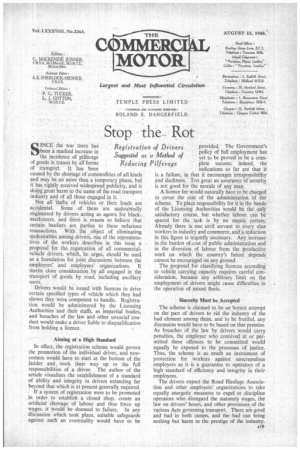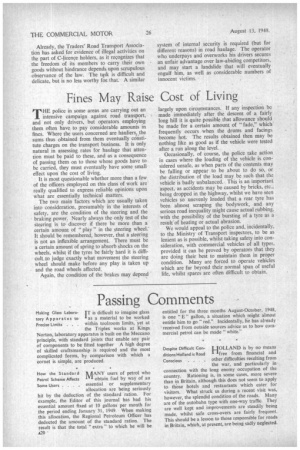Stop the Rot
Page 21

Page 22

If you've noticed an error in this article please click here to report it so we can fix it.
SINCE the war there has been a marked increase in the incidence of pilferage of goods in transit by all forms of transport. It has been caused by the shortage of commodities of all kinds and may be no more than a temporary phase, but it has rightly received widespread publicity, and is doing great harm to the name of the road transport industry and of all those engaged in it. Not all thefts of vehicles or their loads are accidental. Some of them are undoubtedly engineered by drivers acting as agents for blackmarketeers, and there is reason to believe that certain hauliers are parties to these nefarious transactions. With the object of• eliminating undesirables among drivers, one of the representatives of the workers describes in this issue a proposal for the registration of all commercialvehicle drivers, which, he urges, should be used as a foundation for joint discussions between the employers' and employees' organizations. It merits close consideration by all engaged in the transport of goods by road, including ancillary users.
Drivers would be issued with licences to drive certain specified types of vehicle which they had shown they were competent to handle. Registration would be administered by the Licensing Authorities 'and their staffs, as impartial bodies, and breaches of the law and other unsocial' conduct would make a driver liable to disqualification from holding a licence.
Aiming at a High Standard In effect, the registration scheme would govern the promotion of the individual driver, and newcomers would have to start at the bottom of the ladder and, work their way up to the full responsibilities of a driver. The author of the article visualizes the establishment of a standard of ability and integrity in drivers extending far beyond that which is at present generally required.
If a system of registration were to be promoted in order to establish a closed shop, create an artificial shortage of labour and thus force up wages, it would be doomed to failure. In any discussion which took place, suitable safeguards against such an eventuality would have to be provided. The Government's policy of full employment has yet to be proved to be a complete success; indeed, the indications so far are that it is a failure, in that it encourages irresponsibility and slackness. Too great an assurance of security is not good for the morale of any man.
A licence fee would naturally have to be charged to cover the cost of the administration of the' scheme. To place responsibility for it in the hands of the Licensing Authorities would be the only satisfactory course, but whether labour can be spared for the task is by no me.aris certain. Already there is one civil servant to every nine workers in industry and commerce, and a reduction in this figure is urgently necessary. Any, increase in the burden of cost of public administration and in the diversion of labour from the productive work on which the country's future depends cannot be encouraged on any ground.
The proposal for classifying licences according to vehicle carrying capacity requires careful consideration. because any arbitrary limit on the employment of drivers might cause difficulties in the operation of mixed fleets.
Sincerity Must be Accepted' The scheme is claimed to be an 'honest attempt on the part of drivers to rid the industry of the bad element among them, and to be fruitful, any discussion would have to be based on that premise. As breaches of the law by drivers would carry penalties, the employer who connived at or permitted these offences to be committed would equally be exposed to the processes of justice. Thus, the scheme is as much an instrument of protection for workers against unscrupulous employers as it is a guarantee to operators of a high standard of efficiency and integrity in their employees.
The drivers expect the Road Haulage Association and other employers' organizations to take equally energetic measures to expel or discipline operators who disregard the statutory wages, the law on drivers' hours, and other provisions. of the various Acts governing transport. There are good and bad in both camps, and the bad can bring nothing but harm to the prestige of the industry. Already, the Traders' Road Transport Association has asked for evidence of illegal activities on the part of C-Iicence holders, as it recognizes that the freedom of its members to carry their own goods without hindrance depends upon scrupulous observance of the law. The tgsk is difficult and delicate, but is no less worthy for. that. A similar system of internal security is required (but for different reasons) in road haulage. The operator who underpays and overworks his drivers secures an unfair advantage over law-abiding competitors. and may start a landslide that will eventually engulf him, as well as considerable numbers of innocent victims.












































































